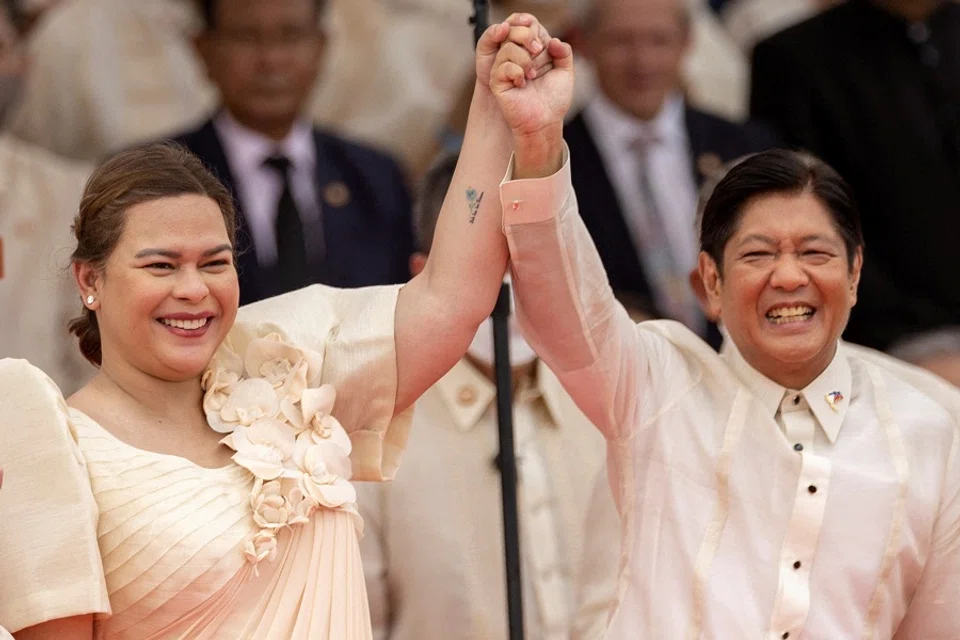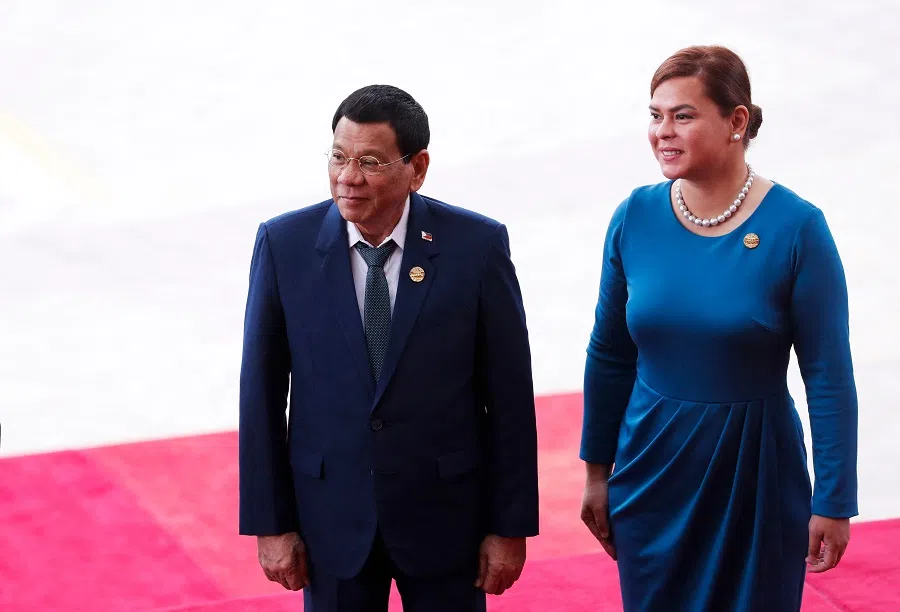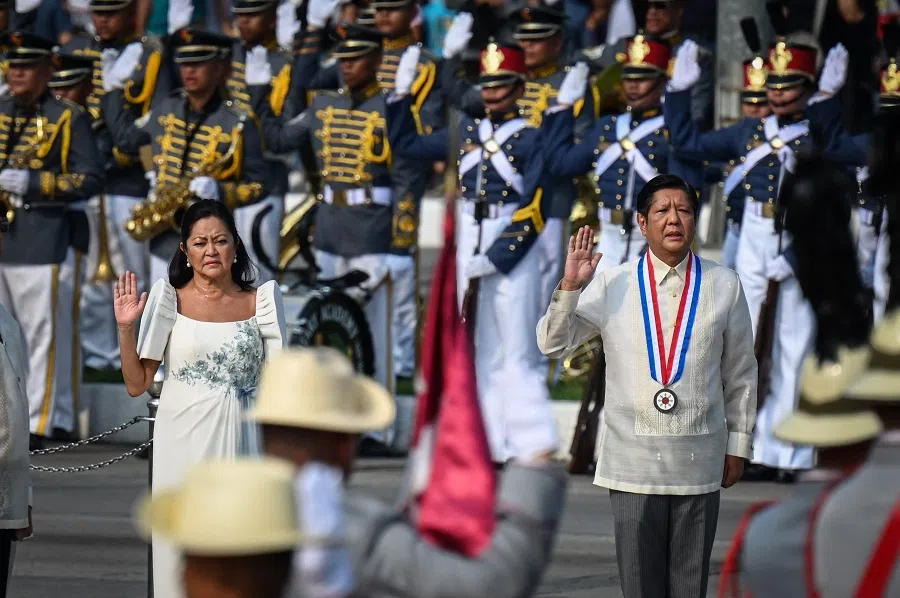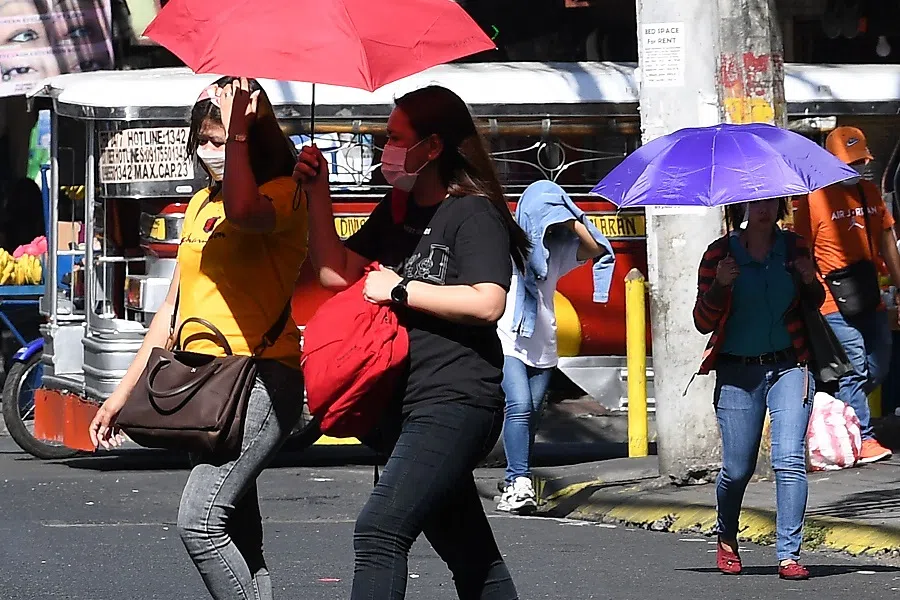The unravelling of the Marcos-Duterte dynastic alliance
The resignation of Vice-President Sara Duterte from cabinet signals the end of the Marcos-Duterte political alliance and the start of a likely clash between two powerful political dynasties.

Last month, Philippine Vice-President Sara Duterte resigned as secretary of education in the Marcos Jr administration. This is the fatal blow to the political alliance between the Marcoses and the Dutertes who dominated the 2022 national elections. With legislative and local elections scheduled for May 2025 and presidential elections for 2028, the demise of the once-formidable tandem could result in intense and bitter competition between these powerful political clans.
In 2022, Marcos Jr and Sara Duterte ran on a platform of unity, even calling their ticket “UniTeam”. With their dynasty’s solid bases in northern Luzon (Marcos) and Mindanao (Duterte), the duo secured an unprecedented majority vote unseen since democracy was restored in the country in 1986. This astonishing electoral mandate was secured by two presidential progenies whose fathers were strongmen leaders known for their populist-authoritarian politics.
There are major policy differences between the two as well as skirmishes between members of their dynasties.
Not an equal power-sharing partnership
Sara Duterte did not give a clear reason for her resignation. But since the start of this year, the writing has been on the wall. There are major policy differences between the two as well as skirmishes between members of their dynasties. Speaking to reporters earlier last month (June 2024), she hinted at the dissolution of their pairing by stating that their tandem was created only to win the 2022 elections. The alliance was more about power acquisition rather than an equal power-sharing partnership.

Though Marcos Jr’s presidential bid rode on a campaign of continuing the policies of his predecessor Rodrigo Duterte, there were actual policy switches and divergences from previous political positions. This included a more pro-US foreign policy, the transparency initiative in the South China Sea, restarting peace talks with the communists and Marcos Jr’s criticism of Duterte’s bloody war on drugs.
... known allies of the Dutertes like the press secretary were purged from their appointed positions and replaced by known Marcos loyalists.
The political clout of the Dutertes within the Marcos Jr administration has also been on the decline. Despite the government having strong majority support in the two houses of Congress, Sara Duterte’s proposal for confidential and discretionary funds in the 2024 budget (amounting to 650 million pesos, to be split between the office of the vice president and the Department of Education) was disapproved.
It is noteworthy that the speaker of the House of Representatives, who is Marcos Jr’s first cousin, allowed this to happen. Moreover, known allies of the Dutertes like the press secretary were purged from their appointed positions and replaced by known Marcos loyalists.
Overt conflict
These moves were compounded when members of each dynasty traded barbs in public. It started when Rodrigo Duterte accused Marcos Jr of being an illegal drug dependent in a public gathering in Davao. He even invited the military to depose Marcos Jr in case he tried to grab power like his father (he mentioned the ill-fated Romanovs of Russia and Italy’s Benito Mussolini.)
As a counter-offensive, the sitting president insinuated that Duterte was heavily addicted to the painkiller fentanyl. In addition, First Lady Liza Araneta-Marcos gave a television interview expressing her disdain for Sara Duterte’s inability to defend Marcos Jr against the scathing remarks made by her family.

The contemptuous word war between the two presidents and members of their dynasties marks a new low in Philippine politics.
There is a clear indication that the Duterte clan has the most to lose with this political divorce. At present, Marcos’s political allies and the opposition are simultaneously undertaking investigations that seek to undermine the legacy of the Duterte presidency, namely the extra-judicial killings from the drug war, the illegal gambling operations of Chinese entities on Philippine soil, and Duterte’s pro-China foreign policy.
While Marcos Jr maintains that his government will not cooperate with the International Criminal Court probe against the Dutertes, his government seems ambivalent on whether they will disallow the prosecutors to enter the country.
... China wants another Duterte to be the country’s next president. Thus, Sino-US rivalry might significantly dictate domestic politics in the years to come.
Potential fallout for the Marcos administration
Likewise, the end of the alliance with Sara Duterte will have negative political repercussions for Marcos Jr and his government. The vice-president remains the most trusted politician in the country with satisfaction ratings higher than the president. The Dutertes continue to have unwavering support in Mindanao as their political bailiwick.
Several politicians, including some senators up for re-election next year, remain loyal to Rodrigo Duterte. If the Dutertes continue to be alienated and even persecuted by the government of the day, they might field three members of their dynasty (Rodrigo and his two sons) in the 2025 senatorial race (though Rodrigo Duterte has denied such a plot).
It remains to be seen whether the two dynasties can find a way to work together again. Given the severely weak status of the liberal-democratic opposition, Marcos Jr and Sara Duterte do not face an existential threat that can significantly challenge their political legitimacy. Hence, the 2025 elections will likely be a proxy battle between the two figures. This might initiate a new wave of political polarisation in the country.

This is peculiar since unlike previous clashes between presidents and vice-presidents in the Philippines, there is an interesting foreign policy dimension between the widening rift between the Marcoses and the Dutertes. It is known that the Dutertes remain in good graces with China while the Marcoses have rekindled their romance with the US since their days in political exile in Hawaii in the 1980s. It is reasonable, then, to assume that China wants another Duterte to be the country’s next president. Thus, Sino-US rivalry might significantly dictate domestic politics in the years to come.
The end of the Marcos-Duterte pairing reveals that promiscuous power-sharing, even between like-minded political dynasties, is untenable in Philippine politics. Not only are there no viable political institutions like parties to secure credible commitment between dynastic elites, but the country’s presidential system also disincentivises coalition-making by reinforcing a winner-take-all logic. In hindsight, it seems that Sara Duterte’s deliberate choice not to contend for the presidency in 2022 was a tremendous political blunder.
This article was first published in Fulcrum, ISEAS – Yusof Ishak Institute’s blogsite.



![[Big read] When the Arctic opens, what happens to Singapore?](https://cassette.sphdigital.com.sg/image/thinkchina/da65edebca34645c711c55e83e9877109b3c53847ebb1305573974651df1d13a)
![[Video] George Yeo: America’s deep pain — and why China won’t colonise](https://cassette.sphdigital.com.sg/image/thinkchina/15083e45d96c12390bdea6af2daf19fd9fcd875aa44a0f92796f34e3dad561cc)
